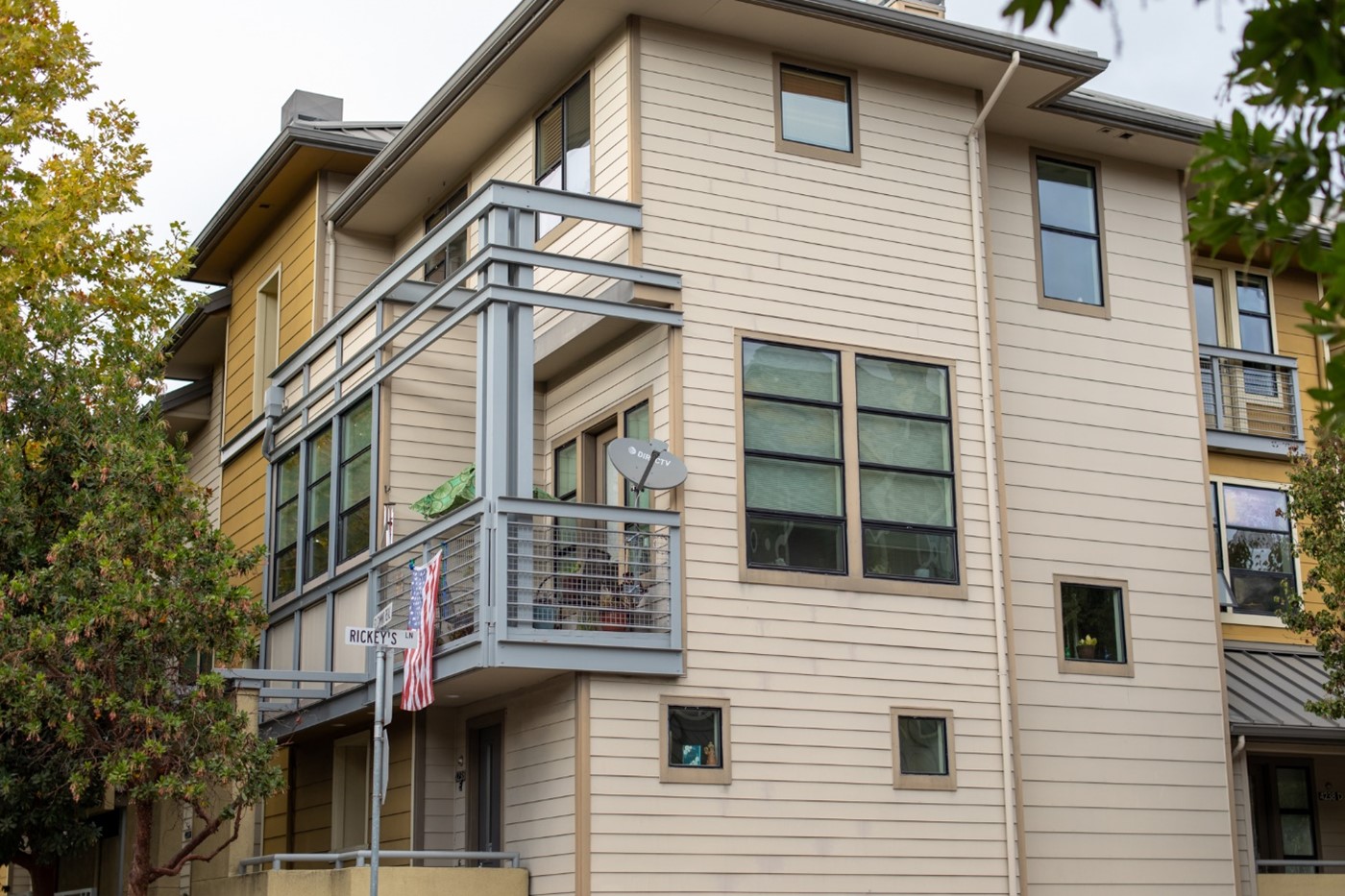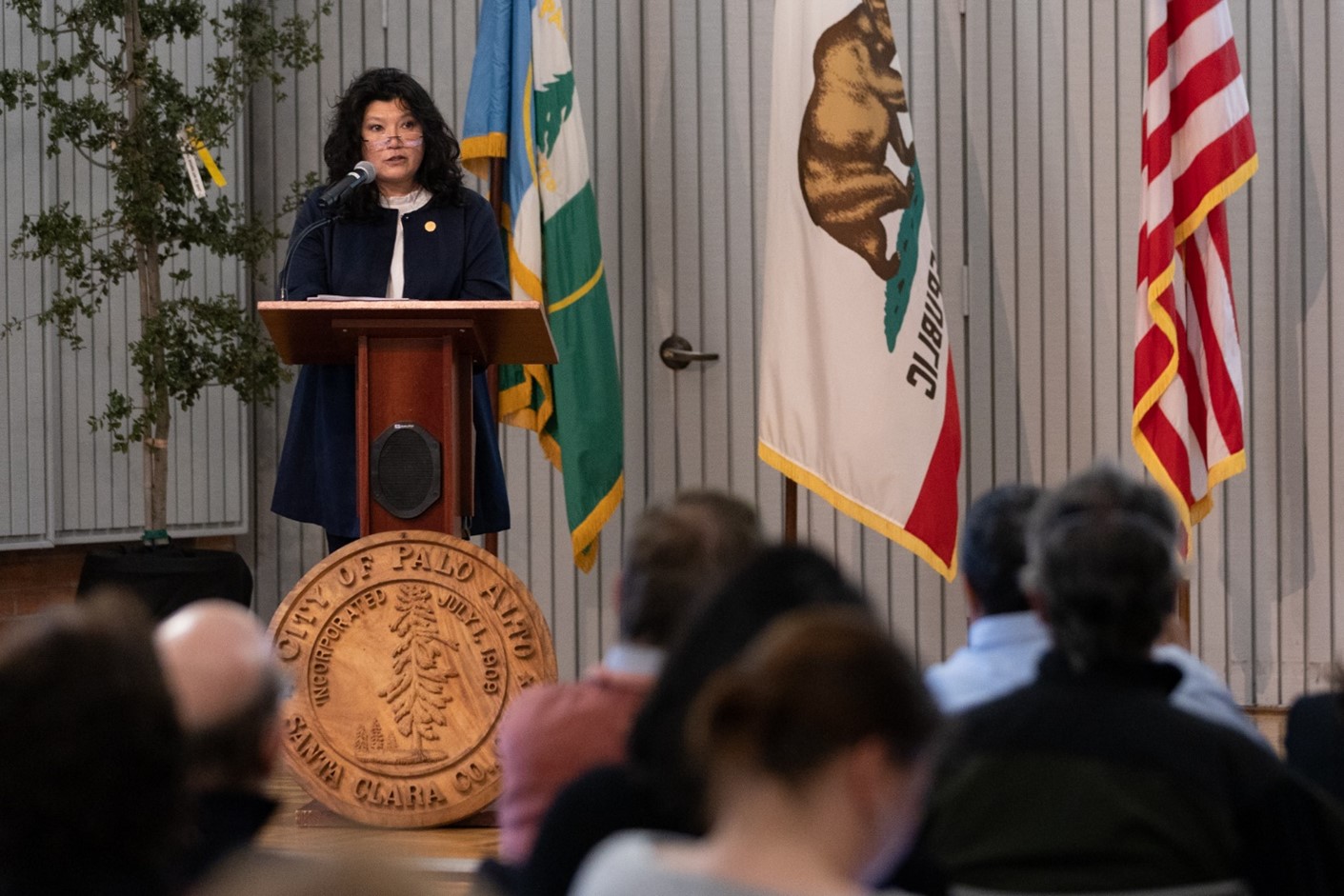Palo Alto considers joining opposition to Senate Bill 423, which would eliminate sunset date for SB 35
by Gennady Sheyner / Palo Alto Weekly
Uploaded: Fri, May 12, 2023, 5:11 pm 0
Time to read: about 3 minutes

Arbor Real homes in Palo Alto. Embarcadero Media file photo by Olivia Treynor.
With California’s legislative season entering a critical juncture, cities are keeping a particularly close eye on Senate Bill 423, a bill that would indefinitely extend an existing law that creates a streamlined approval process for residential projects in cities that fail to meet their housing quotas.
Authored by state Sen. Scott Wiener, D-San Francisco, the bill would remove the sunset date from SB 35, a 2017 law that targets cities that have not met their Regional Housing Needs Allocation obligations. SB 423 has already secured approval from two Senate committees and, like all other Senate bills, faces a deadline of getting out of the upper Legislative chamber by June 2.
SB 35, which was also authored by Wiener, created a streamlined and ministerial process for housing developments that meet objective design standards such as height restrictions and density limits. According to a legislative analysis of the bill, all but 29 of the cities and counties in California are subject to SB 35 because they have failed to generate enough units in one or more income levels to meet their RHNA goals.
In a recent meeting in front of the Senate Finance and Government Committee, Wiener called SB 35 one of the state’s “most successful housing laws.” Since the law’s adoption, most of the state’s 100% affordable housing projects have been subject to SB 35, he said, and the bill has reduced the approval timelines for these projects “from years to months.” The bill and its successor, SB 423, are necessary to address the state’s housing shortage.
“California has an outrageous rate of homelessness. We have working class families who are leaving major metropolitan areas or leaving the state entirely, we have young people who aren’t seeing the future for themselves in the state,” Wiener said. “We are short millions of homes and we need to, at a minimum, double our housing production and probably beyond that.”
SB 35 has a sunset date of Jan. 1, 2026. SB 423 would remove the sunset date and make several modifications to the legislation, including removing an existing exemption for coastal zones, wetlands and protected habitats. The proposed bill would also prohibit local governments from requiring developers to provide studies or other information not relating to the determination of whether the project complies with objective planning standards.
SB 423 has already won approval from the Senate Finance and Government Committee and the Housing Committee and is set to go in front of the Senate Appropriations Committee on May 15.
While both Senate committees supported the bill, SB 423 is also generating opposition from cities who characterize SB 35 and SB 423 as attacks on local control. Redding, Simi Valley, Thousand Oaks and Fairfield are among cities that have come out against the bill and the League of California Cities has argued that the recent rule changes make it hard for cities to implement their housing plans. Jason Rhine, assistant director for legislative affairs at the League of California Cities, told the committee that the organization is particularly concerned about the elimination of the sunset provision.
“We believe at most you should extend the sunset, maybe add a few more years and get a good handle on where it’s working or not, particularly if this bill passes,” Rhine said.
Palo Alto, which has consistently fallen well below RHNA targets when it comes to affordable housing, will have a chance to join the opposition on May 15, when the City Council considers the city’s positions on a variety of state bills. In the past, the city has taken an adversarial position toward housing legislation that creates streamlined and by-right processes for residential projects. The city has opposed recent legislation like Senate Bill 9, which enables lot splits to promote duplexes and triplexes, and Senate Bill 10, which allows cities to build housing at greater densities than would otherwise be allowed in transit-friendly areas. Mayor Lydia Kou cited both bills, as well as SB 35, in her “State of the City” address in March as examples of Sacramento stripping away local control.

“What it does do is take away the ability of local government to make local planning decisions about the built environment and it does not give opportunities to residents and neighbors to provide comments and input,” Kou said during the address. “That goes against the whole meaning of democracy.”
Palo Alto Mayor Lydia Kou speaks at the State of the City event at the Palo Alto Art Center on March 22, 2023. Photo by Magali Gauthier.
The May 15 meeting will give other council members their first chance to weigh in on SB 423 and other proposed legislation. The city’s current legislative guidelines state that council “supports reasonable housing policies that recognize local autonomy to maintain the local public process and preserve local government’s ability to determine land use policies and development standards.” And a new report from the city’s Sacramento lobbying firm, Townsend Public Affairs, lists the city’s status on the bill as “pending opposition.”
“Palo Alto has included in the Legislative Guidelines many principles to support local control of land use and this bill contrasts with that,” the report states.
 Gennady Sheyner covers the City Hall beat in Palo Alto as well as regional politics, with a special focus on housing and transportation. Before joining the Palo Alto Weekly/PaloAltoOnline.com in 2008, he covered breaking news and local politics for the Waterbury Republican-American, a daily newspaper in Connecticut.
Gennady Sheyner covers the City Hall beat in Palo Alto as well as regional politics, with a special focus on housing and transportation. Before joining the Palo Alto Weekly/PaloAltoOnline.com in 2008, he covered breaking news and local politics for the Waterbury Republican-American, a daily newspaper in Connecticut.

